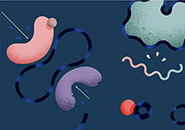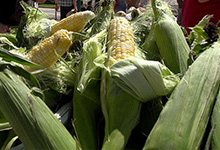Research Summary
Bonnie Bartel's research focuses on genetic approaches in Arabidopsis to elucidate regulatory processes important in plant growth and development. Her HHMI project offers a course to freshmen that is led by graduate students and postdocs who will conduct in-depth discussions of a recent research article from a local lab. Students will then visit the lab of the scientists who wrote the article. Sophomores will begin research in lab modules and progress to working in faculty labs.
Our program seeks to enhance undergraduate and graduate biology education by identifying and mentoring undergraduates with a talent and passion for research while more closely integrating undergraduate teaching with research. We developed a seminar course to expose freshmen to active research and to disseminate information about finding and securing undergraduate research positions. Multiple small groups of freshmen led by interested graduate students or postdocs explore a recent research publication from a local laboratory and a related article from elsewhere. The course centers on homework-guided reading followed by discussion of these two primary research articles. The course culminates in a reception and tour at which students meet the authors and other lab members and view the research organisms and equipment with which the research was performed. We supplement this core structure with additional tours (of the instructor’s lab and a research department in a nearby medical center), attendance at a biology seminar or poster session, and the screening of a science-related documentary film.
Through this course and the accompanying opportunities for advising and exposure, we seek to counter the risk of losing prospective science students in large introductory courses, where individualized attention is lacking and the excitement of science is more difficult to convey. The program benefits undergraduates by providing early connections to research and researchers, easing the transition to conducting contemporary biological research. Participating students gain an enhanced understanding of and appreciation for the research process along with knowledge of whether they might like to pursue a research career. Moreover, the program provides graduate students and postdocs with opportunities to hone their teaching and mentoring skills, more fully equipping them to combine teaching and research effectively.
Research in the Bartel Lab
We use genetic and cell biological approaches in the reference plant Arabidopsis thaliana to elucidate organelle biogenesis and function. Peroxisomes compartmentalize critical metabolic reactions, thereby protecting the cytosol from oxidative damage. Our discovery that an auxin precursor is converted to the active hormone in peroxisomes motivates and facilitates our study of the biogenesis, function, and dynamics of this vital organelle. We are employing various physiological and microscopy-based screens to isolate peroxisome-defective mutants. Our analysis of these mutants has revealed new matrix protein import components, unanticipated interdependencies among peroxisome biogenesis factors, and a novel pathway for degrading peroxisomal matrix proteins during developmentally controlled organelle remodeling. We have uncovered multiple intriguing examples in which Arabidopsis peroxisomes more closely resemble mammalian peroxisomes than do yeast or nematode peroxisomes. Through this research, we are exposing the commonalities and distinctions among plant, microbe, and animal peroxisomes.
Last updated May 2014




